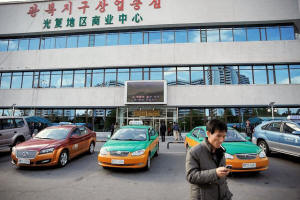|
North Korea's new ad men try out pitches
to new consumer class
 Send a link to a friend
Send a link to a friend
[May 17, 2016]
By James Pearson
PYONGYANG (Reuters) - "Pyongyang Spirit: A
drink you won't forget after drinking once", reads the text of an ad for
a clear, vodka-like North Korean alcohol.
|

Taxis are parked outside a department store in central Pyongyang, North
Korea May 4, 2016. REUTERS/Damir Sagolj/File photo |
|
 No country is further from Madison Ave than Soviet-style North
Korea, but advertising is beginning to emerge as makers of goods try
to pitch products to a rising group of consumers and a wealthy class
of citizens. No country is further from Madison Ave than Soviet-style North
Korea, but advertising is beginning to emerge as makers of goods try
to pitch products to a rising group of consumers and a wealthy class
of citizens.
From whitening toothpaste made from natural ingredients to
sea-cucumber snacks that claim to fight cancer and tuberculosis,
more goods are being sold in colorful ways to the growing class of
"donju", or "masters of money," who generate wealth in a gray market
economy that is allowed to operate but is not formally recognized.
North Korean ads are small and subtly placed, and do not yet compete
with the colorful socialist realist-syle propaganda posters that
line the streets of the capital and praise the ruling Workers' Party
or leader Kim Jong Un.
Still, they are a significant departure in a country where state
propaganda is supposed to have a monopoly on what ideas are sold to
the public.
As with commercials elsewhere, North Korean adverts also prey on the
insecurities and aspirations of would-be customers. The advertised
properties of health goods, for example, would not be out of place
in other Asian countries with a history of traditional herbal
medicine.
 "The main thing North Korean businesses compete on is quality, but
now they're starting to compete in terms of how their products make
people feel," said Andray Abrahamian of Choson Exchange, a
Singapore-based NGO that trains North Koreans in business skills.
Pills to make children grow taller are presented with a bottle
alongside a cartoon giraffe. A purple gem inside a steel ring
promises to cleanse the wearer's blood of all impurities. Other ads
offer services such as car repair, and Android games and program to
install on North Korean mobile phones.
The rudimentary advertisements are usually printed in color on A4 or
A3-sized laminated paper, placed loosely on shop countertops or
enlarged and stuck on shop interior walls. A separate laminated
sheet explaining the history of the product sometimes accompanies
the ad.
This uniquely North Korean style of advertising may have developed
out of trade fairs, Abrahamian said.
As the "donju" have earned money in the unofficial economy, the
flaunting of wealth has become more commonplace, especially in
Pyongyang where those with access to political capital are often the
wealthiest traders.
The advertisements seem acceptable inside shops, but not outdoors,
Abrahamian said. During North Korea's recent Workers' Party
congress, ads could be seen in several Pyongyang shops.
BILLBOARDS
For many years, the only notable ads in North Korea were related to
inter-Korean projects from rich, capitalist rival South Korea,
during a time of better relations.
Large billboards for Pyonghwa Cars, a joint venture between the
North Korean state and South Korea's Unification Church have stood
at several intersections in Pyongyang for years. Their facades are
occasionally updated.
[to top of second column] |

A TV ad for North Korea's Taedonggang Beer was also viewable several
years ago, when South Korean importers took advantage of warming
inter-Korean relations to sell the famed brew in Seoul, where it
still appears on occasional bar menus, listed as "available when
relations are good".
Today's Pyongyang advertisements, however, are targeted at North
Koreans.
Advertising space at football games was offered to local companies
for the first time last year, with boards at Asian Cup matches going
for up to $40,000 for several games, according to a source familiar
with the situation.
Many of the companies advertising at the games were joint ventures
between North Korea and outside investors, usually from China.
Others, such as the Pothonggang Department Store and the Chollima
Tile Factory were very much state affairs.
In another first, the Pyongyang Marathon sold advertising space on
runners' bibs this year and also lined up a main sponsor: the Koryo
Insam Trading Company, which gave out free ginseng-based energy
drinks at the event.
The organizers offered advertising billboards at the marathon from
1,000 euros per space, the source said.
North Korea has a complicated relationship with its growing gray
economy. Advertising, a practice more commonly associated with
capitalist and consumer-led market economies, is at odds with the
centralized Soviet-style economy the isolated country professes to
manage.
In justifying it, the state says advertising holds "important
significance" within North Korea because it "satisfies the growing
material and cultural needs of the people," North Korean academic
Kim Kwang Gil wrote in a North Korean economics journal last
September.

"By actively introducing new products and guaranteeing a high
quality of life and material culture, advertising in a socialist
society helps the love and care of our Party efficiently reach out
the people".
(Additional reporting by Nataly Pak and Rebecca Jang in SEOUL;
Editing by Tony Munroe and Bill Tarrant)
[© 2016 Thomson Reuters. All rights
reserved.]
Copyright 2016 Reuters. All rights reserved. This material may not be published,
broadcast, rewritten or redistributed. |